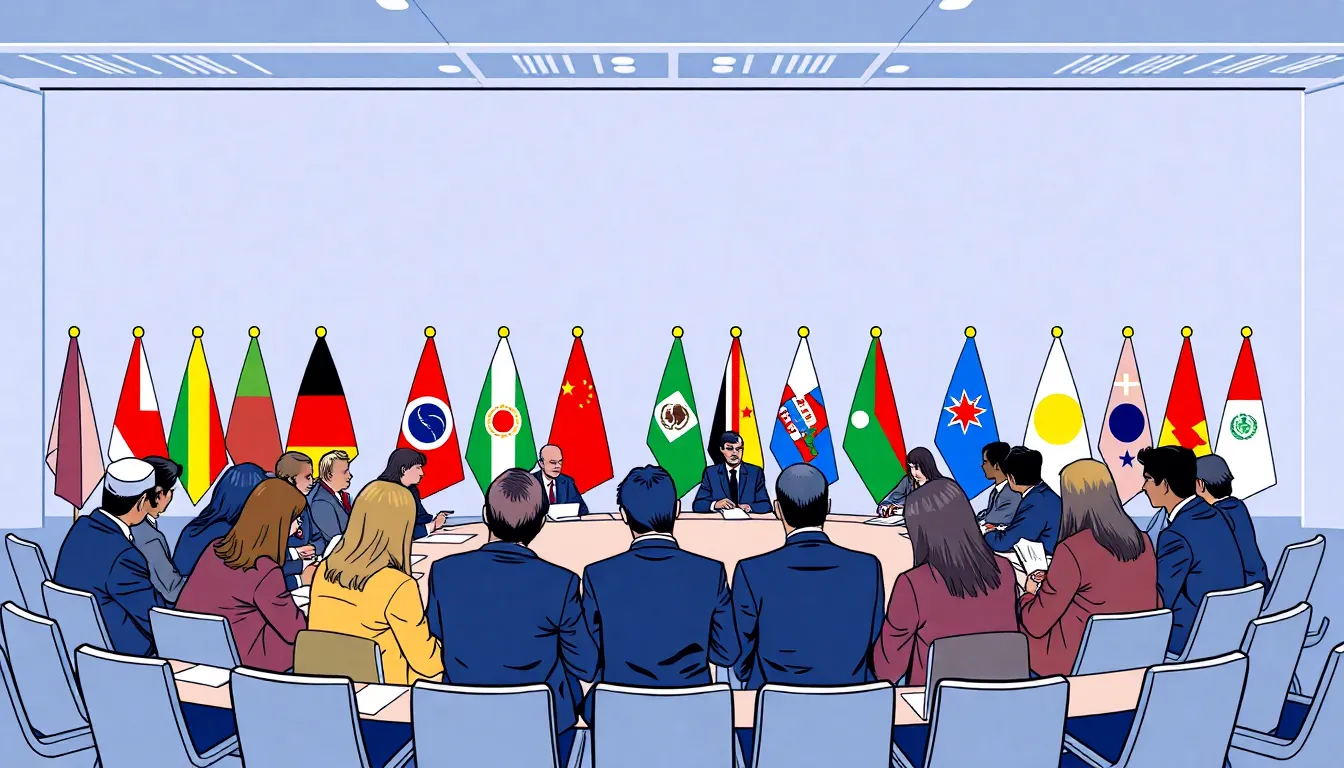Table of Contents
ToggleIn a world that’s more interconnected than ever, international institutions play a vital role in keeping the peace and promoting cooperation. Think of them as the adult supervision at a chaotic family reunion—without them, things could get messy fast. From the United Nations to the World Bank, these organizations tackle everything from global security to economic stability, ensuring countries play nice and share their toys.
But let’s be real: navigating the world of international institutions can feel like trying to understand a cat’s mood. One minute they’re purring, and the next, they’re plotting your demise. Yet, understanding these entities is crucial for anyone wanting to grasp the dynamics of global politics and economics. So buckle up, because diving into the world of international institutions is not just enlightening—it’s essential for anyone keen on making sense of today’s complex international landscape.
Overview of International Institutions
International institutions play a crucial role in promoting peace and stability. They serve as platforms for dialogue among nations, facilitating collaboration on pressing global issues. The United Nations, for example, engages in conflict resolution and humanitarian efforts. This organization includes various specialized agencies, each targeting specific challenges like health or education.
Another key institution, the World Bank, focuses on economic development. It provides financial and technical assistance to developing countries, aiming to reduce poverty and enhance living standards. Through programs and projects, the World Bank significantly impacts global economic growth.
Regional organizations also contribute to international cooperation. The European Union, for instance, fosters political and economic integration among its member states. These institutions address regional disputes and promote shared policies on trade, security, and environmental protection.
International institutions vary in structure and function, yet they share common objectives. They offer frameworks for members to negotiate treaties and establish norms. Decision-making processes often involve negotiations, ensuring diverse perspectives are incorporated.
These organizations face challenges, including fostering compliance among member states. Sovereignty issues can complicate enforcement of international agreements. Despite these hurdles, their significance in shaping global governance remains evident.
Broadly, understanding international institutions is vital for engaging in global politics. They provide insights into how nations interact and respond to worldwide challenges. Students, policymakers, and scholars can benefit from studying these institutions’ roles and impacts.
Types of International Institutions

International institutions play various roles in fostering cooperation and stability worldwide. They fall into two main categories: intergovernmental organizations and non-governmental organizations.
Intergovernmental Organizations
Intergovernmental organizations (IGOs) consist of member states that cooperate on common issues. The United Nations and the World Bank are prominent examples, established to promote peace and economic development respectively. IGOs facilitate dialogue among governments and provide platforms for collective decision-making. They address numerous global challenges such as environmental protection, security, and economic growth. By pooling resources and expertise, IGOs enhance member states’ capabilities to tackle cross-border issues effectively.
Non-Governmental Organizations
Non-governmental organizations (NGOs) operate independently from governments and often focus on humanitarian, environmental, or developmental initiatives. They play critical roles in advocating for human rights, disaster relief, and sustainable development. Examples include Amnesty International and World Wildlife Fund. NGOs mobilize public support and provide grassroots solutions to local problems. Collaborating with IGOs and local authorities, these organizations complement governmental efforts by implementing programs that directly impact communities. Their flexibility allows them to respond quickly to emerging needs in various regions.
Role of International Institutions in Global Governance
International institutions play pivotal roles in fostering cooperation and maintaining stability among nations. They address vital global challenges through their various functions.
Peacekeeping and Security
Peacekeeping forces, deployed by organizations like the United Nations, maintain order in conflict zones. Troops from diverse countries work together to protect civilians and ensure compliance with ceasefires. Effective mediation efforts reduce tensions, facilitating dialogue among conflicting parties. They often assist in rebuilding war-torn societies through support for democratic processes and reconciliation. Data shows that peacekeeping missions significantly lower the risk of renewed violence, proving their effectiveness in stabilizing regions. Through these efforts, international institutions enhance global security and contribute to long-term peace.
Economic Development
International institutions, such as the World Bank, focus on economic growth initiatives to elevate living standards. Financial aid and technical support facilitate infrastructure projects in developing countries, driving sustainable development. Investments target sectors like education, healthcare, and agriculture, addressing poverty directly. Collaborations with local governments help implement programs tailored to specific community needs. Statistics indicate that countries receiving World Bank assistance often experience accelerated growth rates, showcasing the impact of these initiatives. By enhancing economic opportunities, international institutions foster resilience and prosperity on a global scale.
Challenges Facing International Institutions
International institutions encounter various challenges that impact their effectiveness and credibility. Prominent issues include political influence, funding constraints, and resource allocation.
Political Influence and Bias
Political influence significantly affects decision-making within international institutions. Member states often leverage their power to shape policies that align with their national interests. Bias may emerge when powerful nations dominate discussions, sidelining smaller countries and diminishing their voices. Institutional actions can reflect these disparities, resulting in unequal treatment among nations. This imbalance undermines the credibility of organizations like the United Nations and the World Bank, leading to skepticism regarding their impartiality.
Funding and Resource Allocation
Funding remains a critical challenge for international institutions. Limited resources hinder their capacity to address pressing global issues effectively. Member states contribute to budgets, but fluctuations in political priorities can lead to inconsistent financing. Resource allocation often reflects geopolitical interests rather than addressing urgent needs. Consequently, some initiatives receive inadequate support, limiting their impact on poverty reduction or humanitarian aid. Sustainable funding models are essential to bolster the efficacy of international organizations and ensure they meet their global commitments.
Future of International Institutions
Future developments in international institutions hinge on their ability to adapt to evolving global dynamics. They must respond to emerging challenges like climate change, technological advancements, and global health crises. Organizations such as the United Nations aim to strengthen multilateral cooperation to address these pressing issues effectively.
Increased participation from non-governmental organizations enhances the capacities of intergovernmental organizations. By fostering collaborative efforts, institutions can tackle complex global problems, ensuring a more inclusive decision-making process. This shift emphasizes the importance of grassroots initiatives in shaping policies that affect communities worldwide.
Technological innovation presents opportunities for international institutions to improve efficiency and outreach. Digital platforms can facilitate real-time communication and collaboration among member states, promoting transparency and accountability. Improved data sharing capabilities enhance the ability to respond swiftly to crises, bolstering confidence in the institutions’ effectiveness.
Funding stability remains essential for the continued operation of international institutions. Many organizations face financial constraints that limit their ability to implement programs and initiatives. Sustainable funding models, which prioritize long-term commitments from member states, can help ensure adequate resources for addressing urgent global issues.
Challenges persist for international institutions amidst rising nationalism and geopolitical tensions. Countries prioritizing their interests may undermine collective efforts, impacting the credibility of organizations like the World Bank and the United Nations. Navigating these challenges requires a renewed focus on diplomacy and collaboration, emphasizing shared goals over national agendas.
Ultimately, the future of international institutions depends on their ability to reinvent themselves while maintaining core principles. Adaptability, collaboration, and sustainable funding will serve as vital components in addressing global challenges. Institutions that embrace these elements are likely to remain relevant and effective in an increasingly interconnected world.
International institutions play a pivotal role in shaping global governance and addressing pressing challenges. Their ability to foster dialogue and collaboration among nations is essential for maintaining peace and promoting economic development. As these organizations navigate the complexities of an interconnected world they must adapt to evolving dynamics and emerging threats.
The future of international institutions relies on their commitment to collaboration and sustainable funding. By embracing technological advancements and increasing engagement with NGOs they can enhance their effectiveness and outreach. Understanding the nuances of these institutions is vital for anyone interested in global affairs as it sheds light on the mechanisms through which nations cooperate and confront shared challenges.







